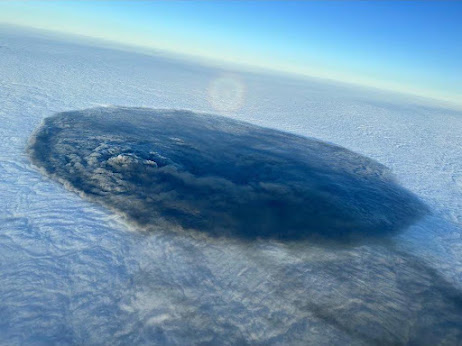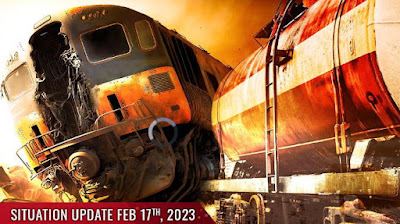"No Way Out for the USA"
by Jeff Thomas
"On the surface, it would appear that the US is in the catbird seat: Since Bretton Woods in 1944, the US has been able to dictate the economy to its trading partners and, to a lesser extent, the rest of the world. Those countries that got on board the Bretton Woods Choo-Choo would be the world’s leaders in commerce, and the rest would take second shrift.
This was possible because, at the end of the war, the US had been supplying the allies with most of their armaments and materiel and had insisted on being paid in gold. By 1944, they held the great majority of the world’s gold and had the most productive manufacturing facilities. They were in a position to call all the shots, and the countries that subsequently made up the First World went along for the ride.
But by the 1970s, the US went off the gold standard and was paying for imports with US Treasuries. This was seen to be a boon at the time, as the Treasuries could be created from thin air, and the demands by the US became boundless. The US became the biggest house on the block, but it was, in fact, a house of cards, which was only as good as the currency it was built upon – not true money but debt.
To paraphrase Norm Franz, "Gold is the money of kings… debt is the money of slaves." The US was, from 1971 on, in the business of enslaving its partners. Along the way, it became more economical to outsource manufacturing, and, over the ensuing decades, the production of most goods came from countries other than the US.
But a wrinkle occurred in recent decades: some of the overseas suppliers of goods, and in particular, energy were now building up their ability for world trade to the point that the US itself was no longer essential. Indeed, better business could often be created between countries without going through the US, and the US was becoming an obstacle to the economic advancement of other nations.
In recent decades, China and Russia have emerged as the most essential providers of goods and energy, respectively, precisely at the time that the US had planned to establish globalism – dominance over the entire world by the US, with the backup support of the other First World countries, most notably, Europe. As long as the other First World countries continued to endorse American diktat to the world, US hegemony would not only continue but expand.
But then, Russia threw a rather major wrench into the works: the Nord Steam pipeline already supplied much of the natural gas to Europe, allowing it to heat its homes and run its factories. With the addition of Nord Stream II, a tipping point was reached: the great majority of Europe’s essential energy, which it was unable to produce itself, could be gotten from Russia and at a price that no other supplier could match.
What’s often overlooked in the discussion of the importance of Nord Stream II is that, from the first day that the tap was to be turned on to supply Europe, US hegemony would end. Although the US had succeeded in dominating European policy over the last half-century, that situation had now reversed. In a choice between pleasing the US and pleasing the eastern suppliers of goods and energy, Europe’s default position would now be with Asia, not the US.
In this one seemingly minor change in supply, the hegemony of the US would cease. And, more troublingly, US power had been a house of cards for decades. It was no longer a manufacturing titan; in fact, it now produced little besides debt. It had once used its manufacturing capacity to bully its trading partners, but now this power had become a mere remnant.
In recent decades, the US has been operating on its past laurels and the assumption that it was the big boy on the block and must be obeyed, no matter how unreasonable its demands were. When US federal and corporate leaders realized their dilemma, they understood that they had only one last-ditch option: war. Historically, this is always the last play of a dying empire: when you’re about to lose everything, a major war must be created as a distraction to buy time.
A small war is only a temporary respite. A major war serves to upset the world as a whole. If the world can be turned upside down, perhaps there’s a chance that the dying empire can actually survive with some of its power intact. If not, the empire goes the way of the dodo. It slips away into insignificance or even extinction. And this is where the US now finds itself. The shift to the Asian century is well underway. Quietly, one nation after another is shifting its trade and its deference to the Asian leaders. Those countries like Saudi Arabia, that can make dramatic shifts and do so safely, will be bolder in their shift. Less powerful countries will be a bit more subtle, tiptoeing away from their former master. And that, too, is now underway.
But again, the key ally of the US – the one without which it could not be an empire - has been Europe. The EU is already on the ropes; it was a misconceived experiment from the start and has now begun to splinter. Although no major breakup has begun, the rot is already beyond any possible salvage, and the dictates of Brussels are encountering refusals by some member countries.
With the destruction of the Nord Stream pipelines, it has become quietly apparent in Germany and other EU countries that they will be facing extreme hardships as a result. They can no longer back out of their support for the US push to create warfare in Ukraine. Additionally, they face the US attempt to draw all the NATO countries into war with Russia – a suicidal prospect for Europe.
The US, in its desperation to escalate the war, has begun to suggest that a "limited nuclear war" might be advisable, but Europe understands that a limited nuclear war is akin to being "a little bit pregnant." Europe would not survive such a war. And so, Germany has begun the pull away from the US. President Olaf Scholz has personally gone to Beijing to broker peace. In doing so, he also makes a clear statement: Germany is acknowledging that it is moving over to a new master.
To be sure, the US will not take this lightly. There will be collective nail-biting in the First World countries as the average man wonders and worries whether the US will do the sane thing and back away from warfare. What the average man does not understand is that, whilst this may be the best choice for the average man and the world in general, it would be the end for those who rule the US. The US would slide inexorably into a lesser state, or even fragment, leaving the US elite with no empire to rule.
This, above all, cannot be tolerated. And, so, it’s important to understand that, to the rulers of the US empire, this is an all-or-nothing game. And to be clear, it’s a game that cannot be won. The US no longer produces much; it no longer has a meaningful balance of trade; it’s the most indebted nation in world history; it’s broke, and it can no longer win a protracted war.
And, to reiterate, the US has no other option at this point. It has destroyed all its other options and has no way out of its dilemma – its modern-day Thucydides Trap. As such, it will not go quietly. Much like a cornered rat, it will make a last attempt to take down as many others as it can on its way out. That should give us pause. Those who wish to avoid becoming collateral damage as the behemoth falls would be advised to extricate themselves, economically and even geographically, from the dying empire."



















